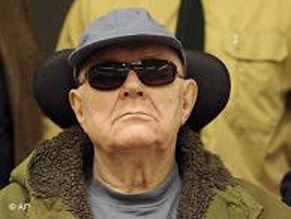|
World Jewish News

John Demjanjuk
|
Demjanjuk calls Munich trial ‘torture’
14.04.2010, Holocaust John Demjanjuk addressed the court at his German war crimes trial for the first time, expressing anger over the proceedings.
In a statement read by his attorney, Ulrich Busch, in the Munich courtroom on Tuesday, Demjanjuk, 90, called the trial "torture." Demjanjuk was officially charged in December 2009 as an accessory to the murder of 29,700 Jews at the Sobibor death camp in Poland in 1943. The trial is expected to conclude in the summer of 2010.
According to reports Tuesday in German news media, Demjanjuk said he had been "forcibly deported" from the United States to face a "false accusation of accomplice to murder" after "30 years of legal persecution in Israel, the United States and Poland." He blamed Jewish groups, namely the World Jewish Congress and the Simon Wiesenthal Center, for leveling false charges against him.
Repeating themes often raised by his attorney, Demjanjuk said Germany is now trying to "turn a prisoner of war into a war criminal." According to Demjanjuk, he was a Red Army soldier taken prisoner by the Nazis.
According to reports, Demjanjuk blamed Germany "for using violence and threats of execution to force thousands upon thousands to work in perverse mass-extermination camps."
He did not say whether he himself had worked in one of these camps, as the prosecution maintains.
Demjanjuk, born in Ukraine, immigrated to the United States after the war and lived in suburban Cleveland. He has faced more than one trial on war crimes charges. A death sentence against him was overturned in Israel after the Supreme Court found reasonable doubt that he was a guard at the Treblinka death camp. In May 2009, he was deported from the United States to Germany, where he is standing trial on the Sobibor charges.
Of the victims named in the case, most are Dutch or German. In Germany, a charge of accessory to murder may only be brought if the victims’ names are known.
JTA
|
|
